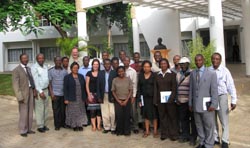A two days’ sensitization workshop was conducted from 11-12/2/2013 at The Nelson Mandela African Institute of science and Technology in – Arusha – Tanzania, to plan for the N2Africa project activities in Northern Tanzania. The workshop was attended by more than 30 participants. Representatives from N2 Africa project in the Netherlands, CIAT - TSBF, PABRA, government agencies from Tanzania (Extension, Research and Foundation Seed Farm), NGO operating in the Northern zone (World Vision Tanzania, RUDI, Catholic Relief Services, FAIDA MaLi, Tanzania Horticultural Association, Alpha Seed Company and Crop Bioscience Solutions LTD); Community Based Organizations in the northern zone (Usambara Lishe Trust and Ubwiri Women Group) and The Nelson Mandela African Institute of Science and Technology were invited. In total, representatives were drawn from three regions from Northern Zone and were represented by four districts as follows: Arusha – (Arumeru – district), Kilimanjaro – (Moshi Rural and Hai districts) and Tanga – (Lushoto district). The initiative involved a mix of different institutions operating in Northern Tanzania. It was anticipated that by bringing together highly qualified researchers supported by extension, NGOs and CBOs’ will form a strong alliances, where the resulting synergies from the expertise of each partner will significantly add value to the planned project.
In Northern Tanzania, the common bean (Phaseolus vulgaris L.) is a major food grain legume grown mostly by resource-poor farmers without fertiliser inputs. Despite the attractive local price of beans, the yields of this grain legume have remained very low under farmer conditions. This low yield is, in part, associated with abiotic and biotic constraints such as low soil fertility and reduced N2 fixation and the occurrence of various diseases and insect pests. To alleviate some of these problems, N2 Africa project has stepped in to initiate collaborative activities with a variety of stakeholders in northern Tanzania to scale up and disseminate the appropriate technology to improve the plant nutrition of bean plants and increase the final yield.
| The planning workshop was very successful and participative. One of the extension officer confessed that it was her first time to be involved in planning of research activities in her carrier. |
 |
After exchanging ideas and experience, participants in the workshop decided to promote the dissemination of released climbing common bean varieties in the northern highlands which can yield four times more than the conventional bush types. This will be accompanied by staking, small addition of Triple Super Phosphate (TSP), Farm Yard Manure (FYM) and rhizobial inoculants. The planned demonstrations will be conducted in farmers’ fields starting from March 2013. A possibility of involving private companies to produce rhizobial inoculants in northern Tanzania was discussed.
This project is expected to produce meaningful results by improving the livelihood of the small scale farmers in northern Tanzania.
Patrick Ndakidemi
